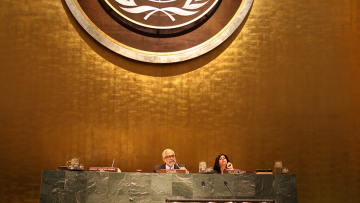Looking back at when the work of the Commission began in 1947, Mr. Montiel compared today’s event to the very first, which took place at the temporary UN headquarters in Lake Success, New York.
“Just 10 delegates and 9 observers attended that first Commission. I hope you have had a chance to look at the brochure and exhibition that we have put together for your celebration. In the photos from 70 years ago, you will see a small group of dedicated statisticians gathered around a few tables,” Mr. Montiel said.
 Commending on the many achievements over the past 70 years, Mr. Montiel mentioned the Commission’s approval of the first international standard, the International Standard Industrial Classification of all Economic Activities (ISIC) in 1949, and the many more that followed, including the Fundamental Principles of Official Statistics in 1994.
Commending on the many achievements over the past 70 years, Mr. Montiel mentioned the Commission’s approval of the first international standard, the International Standard Industrial Classification of all Economic Activities (ISIC) in 1949, and the many more that followed, including the Fundamental Principles of Official Statistics in 1994.“Over this past year, you have shown yet again that you can rise to new challenges,” Mr. Montiel said, referring to the work on agreeing on a global indicator framework to measure progress on the Sustainable Development Goals (SDGs).
“I encourage you to be bold, to approve the global indicator framework, and to transmit it to ECOSOC and the General Assembly, thus complying with the concrete mandate given to you,” he said. “In doing so, you will add the final missing critical piece to the 2030 Agenda for Sustainable Development.”
 To commemorate the seventieth anniversary, the opening session featured remarks by Aija Zigure, President of Central Statistical Bureau of Latvia and Pali Lehohla, Statistician-General, Head of Statistics South Africa, who both described the important role of the Commission in developing the global statistical system?and in shaping the statistical systems of their countries.
To commemorate the seventieth anniversary, the opening session featured remarks by Aija Zigure, President of Central Statistical Bureau of Latvia and Pali Lehohla, Statistician-General, Head of Statistics South Africa, who both described the important role of the Commission in developing the global statistical system?and in shaping the statistical systems of their countries.“The scope of work of the UN is far more extensive than that of any other international statistical organisation,” said Ms. Zigure. “I believe that the United Nations Fundamental Principles of Official Statistics are one of the best-known UN products of global significance,” she said. “Although they were adopted long ago, they still are as topical as always”.
“Statistics is a conduit of trust. Only the trusted are its stewards and custodians,” said Mr. Lehohla. He also discussed the evolvement of the global statistical collaboration, its comradeship, enjoyable peer learning and the significance of this work on the national level.
 “Let us follow the example of the late Professor Hans Rosling who implores us to reveal the beauty and intrinsic value of statistics: trust. He implores us to measure the effectiveness of our communication on the SDGs. Failure to do so he says will fail the world. It is in our hands not to be forgotten, but to be remembered as stewards, custodians and transformers of statistics seventy years from now,” Mr. Lehohla concluded.
“Let us follow the example of the late Professor Hans Rosling who implores us to reveal the beauty and intrinsic value of statistics: trust. He implores us to measure the effectiveness of our communication on the SDGs. Failure to do so he says will fail the world. It is in our hands not to be forgotten, but to be remembered as stewards, custodians and transformers of statistics seventy years from now,” Mr. Lehohla concluded.Running from 7 to 10 March, the four-day event brings together around 300 statisticians from 130 Member States. They will review and decide upon a wide range of statistical areas, including on data and indicators for the 2030 Agenda for Sustainable Development, big data for official statistics, quality assurance of the global statistical system, social statistics, integration of statistical and geospatial information and tourism statistics.

